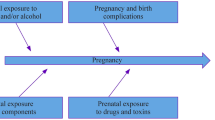Abstract
Objectives
Individuals with prenatal alcohol exposure (PAE) may be diagnosed with fetal alcohol spectrum disorder (FASD) if they have significant impairments in at least three different areas of functioning. The areas of functioning are viewed as separate entities for diagnostic consideration; however, some areas, including executive functioning (EF), attention, and adaptive functioning, may overlap. Therefore, the objective of this study was to examine the relationship between EF, attention, and adaptive functioning among children with PAE and determine whether specific moderators influence the association.
Methods
Charts of 257 children seen for an FASD diagnostic assessment were reviewed (60% males; Mage = 10.0 years). Measures included diagnosis of ADHD; informant ratings of EF, attention, and adaptive functioning; and tests of EF. Correlation and moderator analyses were conducted to examine the association between the variables.
Results
Significant associations were found between informant ratings of adaptive functioning and informant ratings (r = − .15 to − .58) and tests scores (r = .20 to .42) of EF. Correlations between measures assessed by the same informant were stronger than those assessed by different informants. Age, gender, and ADHD diagnostic status significantly moderated a few correlations.
Conclusions
Although none of the correlations were indicative of convergent validity, our results suggest a lack of discriminant validity across the measures. The findings suggest that our assessment tools were measuring distinct but overlapping constructs, and this overlap should be considered in future research on clinical decision-making regarding diagnosis and interventions that target these areas of functioning.
Similar content being viewed by others
Data Availability
Ethics approval for this project did not include the transmission of data outside of our study team and institution, the SSCY Centre. Based on the ethics approval of this project, all data were required to remain on-site and to be physically housed and accessed internally at the SSCY Centre.
References
American Psychiatric Association. (2013). Diagnostic and statistical manual of mental disorders (5th ed.). https://doi.org/10.1176/appi.books.9780890425596
Ary, D., Jacobs, L. C., & Razavieh, A. (1996). Introduction to research in education. Harcourt Brace College Publishers.
Barkley, R., & Murphy, K. (2011). The nature of executive function (EF) deficits in daily life activities in adults with ADHD and their relationship to performance on EF tests. Journal of Psychopathology and Behavioral Assessment, 33(2), 137–158. https://doi.org/10.1007/s10862-011-9217-x
Bauminger, N. (2002). The facilitation of social-emotional understanding and social interaction in high-functioning children with autism: Intervention outcomes. Journal of Autism and Developmental Disorders, 32(4), 283–298. https://doi.org/10.1023/A:1016378718278
Bertollo, J. R., & Yerys, B. E. (2019). More than IQ: Executive function explains adaptive behavior above and beyond nonverbal IQ in youth with autism and lower IQ. American Journal on Intellectual and Developmental Disabilities, 124(3), 191–205. https://doi.org/10.1352/1944-7558-124.3.191
Cheung, K., & Taylor, N. (2020, November 26–27). The association between performance-based measures and caregiver ratings of executive functioning among children and adolescents with prenatal alcohol exposure. 7th Biennial Conference on Developmental Disabilities: Health and Wellbeing across the Lifespan, Virtual Conference. https://interprofessional.ubc.ca/initiatives/dd2020/
Chudley, A. E., Conry, J., Cook, J. L., Loock, C., Rosales, T., & LeBlanc, N. (2005). Fetal alcohol spectrum disorder: Canadian guidelines for diagnosis. CMAJ, 172, S1–S21. https://doi.org/10.1503/cmaj.1040302
Coles, C., Kable, J., Taddeo, E., & Strickland, D. (2018). GoFAR: Improving attention, behavior and adaptive functioning in children with fetal alcohol spectrum disorders: Brief report. Developmental Neurorehabilitation, 21(5), 345–349. https://doi.org/10.1080/17518423.2018.1424263
Cook, J. L., Green, C. R., Lilley, C. M., Anderson, S. M., Baldwin, M. E., Chudley, A. E., Conry, J. L., LeBlanc, N., Loock, C. A., Lutke, J., Mallon, B. F., McFarlane, A. A., Temple, V. K., Rosales, T., & Canada Fetal Alcohol Spectrum Disorder Research Network. (2016). Fetal alcohol spectrum disorder: A guideline for diagnosis across the lifespan. CMAJ: Canadian Medical Association Journal, 188(3), 191–197. https://doi.org/10.1503/cmaj.141593
Crawford, A., Te Nahu Rongomaiwahine rāua ko Kahungunu, L. T. H., Peterson, E. R., McGinn, V., Robertshaw, K., & Tippett, L. (2020). Cognitive and social/emotional influences on adaptive functioning in children with FASD: Clinical and cultural considerations. Child Neuropsychology, 26(8), 1112–1144. https://doi.org/10.1080/09297049.2020.1771296
Crocker, N., Vaurio, L., Riley, E., & Mattson, S. (2009). Comparison of adaptive behavior in children with heavy prenatal alcohol exposure or attention-deficit/hyperactivity disorder. Alcoholism: Clinical and Experimental Research, 33(11), 2015–2023. https://doi.org/10.1111/j.1530-0277.2009.01040.x
Delis, D. C., Kaplan, E., & Kramer, J. H. (2001). Delis-Kaplan Executive Function System (D-KEFS). The Psychological Corporation.
Diamond, A. (2013). Executive functions. Annual Review of Psychology, 64, 135–168. https://doi.org/10.1146/annurev-psych-113011-143750
Doyle, L. R., Moore, E. M., Coles, C. D., Kable, J. A., Sowell, E. R., Wozniak, J. R., Jones, K. L., Riley, E. P., Mattson, S. N., & the CIFASD. (2018). Executive functioning correlates with communication ability in youth with histories of heavy prenatal alcohol exposure. Journal of the International Neuropsychological Society, 24(10), 1026–1037. https://doi.org/10.1017/S1355617718000772
Elliott, R. (2003). Executive functions and their disorders. British Medical Bulletin, 65, 49–59. https://doi.org/10.1093/bmb/65.1.49
Fagerlund, Å., Autti-Rämö, I., Kalland, M., Santtila, P., Hoyme, H. E., Mattson, S. N., & Korkman, M. (2012). Adaptive behaviour in children and adolescents with foetal alcohol spectrum disorders: A comparison with specific learning disability and typical development. European Child & Adolescent Psychiatry, 21(4), 221–231. https://doi.org/10.1007/s00787-012-0256-y
Gardiner, E., & Iarocci, G. (2018). Everyday executive function predicts adaptive and internalizing behavior among children with and without autism spectrum disorder. Autism Research: Official Journal of the International Society for Autism Research, 11(2), 284–295. https://doi.org/10.1002/aur.1877
Gilotty, L., Kenworthy, L., Sirian, L., Black, D. O., & Wagner, A. E. (2002). Adaptive skills and executive function in autism spectrum disorders. Child Neuropsychology, 8(4), 241–248. https://doi.org/10.1076/chin.8.4.241.13504
Gioia, G. A., Isquith, P. K., Guy, S. C., & Kenworthy, L. (2000). BRIEF: Behavior Rating Inventory of Executive Function. Psychological Assessment Resources.
Harrison, P. L., & Oakland, T. (2003). Adaptive Behavior Assessment System (2nd ed.). Harcourt Assessment.
Harrison, P. L., & Oakland, T. (2015). Adaptive Behavior Assessment System (3rd ed.). Western Psychological Services.
Herman, L. E., Acosta, M. C., & Chang, P. N. (2008). Gender and attention deficits in children diagnosed with a fetal alcohol spectrum disorder. Journal of Population Therapeutics and Clinical Pharmacology, 15(3), e411–e419.
Hoaglin, D. C., Iglewicz, B., & Tukey, J. W. (1986). Performance of some resistant rules for outlier labeling. Journal of American Statistical Association, 81, 991–999. https://doi.org/10.2307/2289073
Kingdon, D., Cardoso, C., & McGrath, J. J. (2016). Research review: Executive function deficits in fetal alcohol spectrum disorders and attention-deficit/hyperactivity disorder: A meta-analysis. Journal of Child Psychology and Psychiatry, 57(2), 116–131. https://doi.org/10.1111/jcpp.12451
Krasny, L., Williams, B., Provencal, S., & Ozonoff, S. (2003). Social skills interventions for the autism spectrum: Essential ingredients and a model curriculum. Child and Adolescent Psychiatric Clinics of North America, 12(1), 107–122. https://doi.org/10.1016/S1056-4993(02)00051-2
Lindblad, I., Nasic, S., Landgren, M., Svensson, L., Gillberg, C., & Fernell, E. (2017). Adaptive skills are useful for evaluating the effect of pharmacological treatment in children with attention-deficit/hyperactivity disorder. Acta Paediatrica, 106(1), 96–100. https://doi.org/10.1111/apa.13631
Lopata, C., Smith, R. A., Volker, M. A., Thomeer, M. L., Lee, G. K., & McDonald, C. A. (2013). Comparison of adaptive behavior measures for children with HFASDs. Autism Research and Treatment, 2013, 1–10. https://doi.org/10.1155/2013/415989
Pugliese, C. E., Anthony, L., Strang, J. F., Dudley, K., Wallace, G. L., & Kenworthy, L. (2015). Increasing adaptive behavior skill deficits from childhood to adolescence in autism spectrum disorder: Role of executive function. Journal of Autism and Developmental Disorders, 45(6), 1579–1587. https://doi.org/10.1007/s10803-014-2309-1
Rai, J. K., Abecassis, M., Casey, J. E., Flaro, L., Erdodi, L. A., & Roth, R. M. (2017). Parent rating of executive function in fetal alcohol spectrum disorder: A review of the literature and new data on Aboriginal Canadian children. Child Neuropsychology, 23(6), 713–732. https://doi.org/10.1080/09297049.2016.1191628
Rasmussen, C., & Bisanz, J. (2009). Executive functioning in children with fetal alcohol spectrum disorders: Profiles and age-related differences. Child Neuropsychology, 15(3), 201–215. https://doi.org/10.1080/09297040802385400
Rasmussen, C., Horne, K., & Witol, A. (2006). Neurobehavioral functioning in children with fetal alcohol spectrum disorder. Child Neuropsychology, 12(6), 453–468. https://doi.org/10.1080/09297040600646854
Reynolds, C. R., & Kamphaus, R. W. (2015). Behavior assessment system for children (3rd ed.). Pearson.
Sakano, M., Mukherjee, R., & Turk, J. (2019). Behaviour and adaptive functioning in children and young people with fetal alcohol spectrum disorders: A UK study. Advances in Dual Diagnosis, 12(1/2), 62–72. https://doi.org/10.1108/ADD-10-2018-0016
Tamana, S., Pei, J., Massey, D., Massey, V., & Rasmussen, C. (2014). Neuropsychological impairments and age-related differences in children and adolescents with fetal alcohol spectrum disorders. Journal of Population Therapeutics and Clinical Pharmacology, 21(2), e167–e180.
Taylor, N. M., & Enns, L. N. (2018). Age-related differences in neuropsychological assessment of fetal alcohol spectrum disorder: A cross-sectional study. Biochemistry and Cell Biology, 96(2), 252–259. https://doi.org/10.1139/bcb-2017-0081
Tukey, J. W. (1977). Exploratory data analysis. Addison-Wesley.
Vuontela, V., Carlson, S., Troberg, A., Fontell, T., Simola, P., Saarinen, S., & Aronen, E. T. (2013). Working memory, attention, inhibition, and their relation to adaptive functioning and behavioral/emotional symptoms in school-aged children. Child Psychiatry & Human Development, 44(1), 105–122. https://doi.org/10.1007/s10578-012-0313-2
Ware, A., Crocker, N., O’Brien, J., Deweese, B., Roesch, S., Coles, C., Kable, J., May, P., Kalberg, W., Sowell, E., Jones, K., Riley, E., & Mattson, S. (2012). Executive function predicts adaptive behavior in children with histories of heavy prenatal alcohol exposure and attention‐deficit/hyperactivity disorder. Alcoholism: Clinical and Experimental Research, 36(8), 1431–1441. https://doi.org/10.1111/j.1530-0277.2011.01718.x
Ware, A., Glass, L., Crocker, N., Deweese, B., Coles, C., Kable, J., May, P., Kalberg, W., Sowell, E., Jones, K., Riley, E., Mattson, S., & CIFASD. (2014). Effects of prenatal alcohol exposure and attention‐deficit/hyperactivity disorder on adaptive functioning. Alcoholism: Clinical and Experimental Research, 38(5), 1439–1447. https://doi.org/10.1111/acer.12376
Werlinger, A. (2016). The concordance of caregiver-teacher perspectives on the behavior of children with fetal alcohol spectrum disorder (Doctoral dissertation). Retrieved from UNLV Theses, Dissertations, Professional Papers, and Capstones. 2761. https://doi.org/10.34917/9112210
Whitley, B. E. Jr. (1996). Principles of research in behavior science. Mayfield Publishing.
Acknowledgements
We would like to thank the participating families and their children; the Manitoba FASD Centre, Specialized Services for Children and Youth (SSCY) Centre; the Department of Clinical Health Psychology, University of Manitoba; the Excellence in Neurodevelopment & Rehabilitation Research in Child Health (ENRRICH); and the Children’s Hospital Research Institute of Manitoba (CHRIM); Marvin Routley, Sydney Lisi, Kristi MacDonald, and Kevin Solar for their assistance with data entry. We would also like to thank Drs. Nicole Taylor and Lesley Graff for their helpful suggestions, and Drs. Tracie Afifi and Leslie Roos for their mentorship.
Funding
This study was funded by the Office of the VP (Research & International), University of Manitoba; the Department of Clinical Health Psychology, Rady Faculty of Health Sciences, University of Manitoba; and the Department of Pediatrics and Child Health, Rady Faculty of Health Sciences, University of Manitoba.
Author information
Authors and Affiliations
Contributions
KC: designed and executed the study, completed data analyses, analyzed the data, and wrote sections of the paper. EJ and DW: designed and executed the study, assisted with data analysis planning, analyzed the data, and wrote sections of the paper. CS: completed data entry, assisted with literature review, and editing of the final manuscript. All authors approved the final version of the manuscript for submission.
Corresponding author
Ethics declarations
Ethics Approval
This retrospective chart review study involving human participants was approved by the University of Manitoba Research Ethics Board and the Specialized Services for Children and Youth (SSCY) Research and Evaluation Committee. Given the retrospective nature of this study, informed consent to participate and publish was not required based on the above ethics approval.
Competing Interests
The authors declare no competing interests.
Additional information
Publisher’s Note
Springer Nature remains neutral with regard to jurisdictional claims in published maps and institutional affiliations.
Rights and permissions
About this article
Cite this article
Cheung, K., Johns, E., Willoughby, D. et al. The Association Between Executive Functioning, Attention, and Adaptive Functioning Among Children and Adolescents with Prenatal Alcohol Exposure. Adv Neurodev Disord 5, 431–445 (2021). https://doi.org/10.1007/s41252-021-00216-8
Accepted:
Published:
Issue Date:
DOI: https://doi.org/10.1007/s41252-021-00216-8




